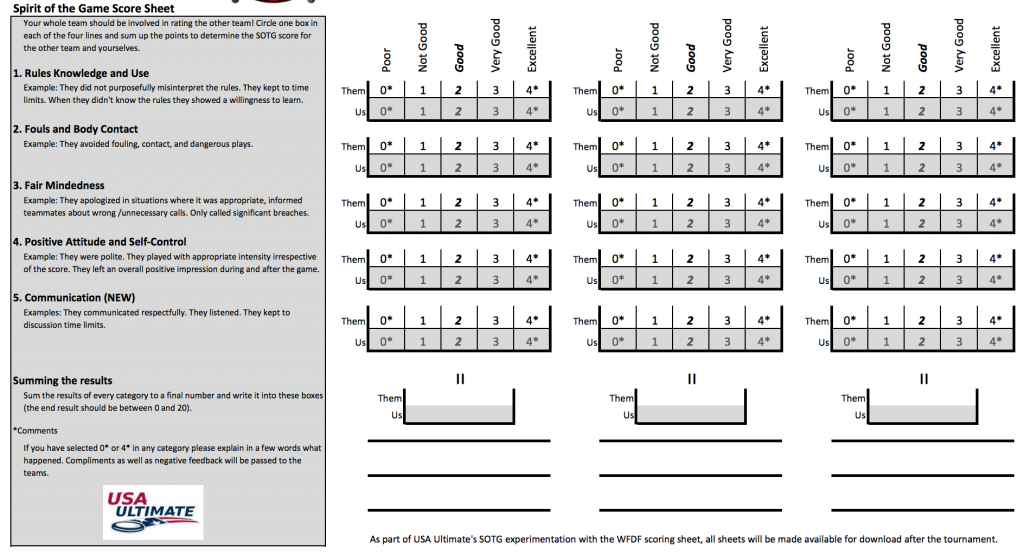Why you shouldn't blindly give 4s on spirit score sheets.
October 8, 2015 by Ravi Vasudevan in Opinion with 48 comments
The spirit scores from Nationals are out and they really seem like a mess.
Jim Parinella has briefly analyzed them and shown that there is huge variance in the way different teams give out spirit scores. This article will attempt to explain why that is, and how spirit scoring should be done. A bit of background on me: I played college ultimate in the US but since graduating I have lived in Europe where I play under WFDF rules.
We have been using the WFDF spirit scoring system for longer than USAU. When I arrived in Europe six years ago, I thought that spirit scoring was something stupidly trying to quantify something that is unquantifiable. However, though I don’t think scores are perfect, I have come around quite a bit and found that if scores are done properly they can pinpoint exemplary, average or terrible spirit and this is a very useful thing to do so I decided to take the time to write this article.
Things have gotten better but there are still a few teams getting spirit scoring really wrong. The worst cases are teams just giving perfect scores across the board (looking at you, Rhino), but there are also teams that do fill in scores but in a different way than the system is designed.
The Scale
This is the most important part of spirit scoring. The fundamental thing that every team needs to understand (and it is hard to do so) is that an average game gets a 10 in spirit (a ‘2’ in each of the five categories). Though some teams adhere to this, it seems that many teams score in more of a “if nothing went wrong, then they should get a ‘4’ in each category” way. The scores are not designed to work this way, so people really have to shift mentalities. The average score you give during a season should be a 10. Sure there are tournaments where exceptional or terrible spirit is on display, but the norm should be an average of 10.
The easiest way to shift this mentality is to look at WFDF’s examples on spirit. Seriously, take a couple minutes and read through the examples. Convince your team to do so as well.
The spirit scores used by USAU are modeled after WFDF’s, so the given examples can be really useful. Note that if you are giving out a ‘4′ in any category you should be explaining in the notes why something was absolutely exceptional. The same holds if you give out a ‘0’. This rarely happens; I think I have played fewer than 10 ‘4’ worthy games in six years of competitive play in Europe and usually only have given out a ‘0’ to teams that are purposefully cheating.
Have your spirit captain save that PDF of the spirit examples to their phone and have it ready when it is time to give out scores.
How To Give Scores Out
This will seem annoying to competitive players who just want to recover from the game and gear up for the next one but if done effectively it literally takes less than five minutes. It is also hugely important because just having a small committee, or worse, just one person doing the scoring, can really shift scores based on a much smaller experience that is not representative of the whole game.
The best system I have seen is that the spirit captain gets the whole team in a circle immediately after the game and quickly goes through each category. The spirit captain just yells out, “Okay, Rules Knowledge and Use?” And then everyone puts up fingers with 0, 1, 2, 3, 4. It helps to use height to also represent your score, so just throw two fingers out in front of you for a 2, raise your three fingers a little bit for a 3, lower a finger a little for a 1, raise four fingers overhead for a 4 and throw your fist to the ground for a 0. Then you can usually just take the most common score, but briefly allow anyone to share their experience if they feel that this is an unfair score. This system is really effective and gets the whole job done quickly but makes the score representative of the entire team’s experience.
Why This Is Important
So why worry about this? Who cares? Well anyone who thinks that it is important to have a self-officiated sport should care. Anyone who wants to have teams held accountable for cheating, excessive physicality, or disrespect should care.
If this is more uniformly done correctly, then the spirit scores can really reflect how spirited teams really are and organizations like USAU can actually punish teams when they get low scores. There are European organizations who ban teams if they continuously get bad spirit scores and don’t report on ways that they are actively trying to improve. Perhaps this is too harsh but if a team is regularly getting really low spirit scores, then USAU can take some measures to figure out how to deal with the situation. Of course you may just think spirit scoring is worthless and a waste of time, but if done properly it really will take a few minutes each game.
Since we have to do them, we may as well do them properly.
